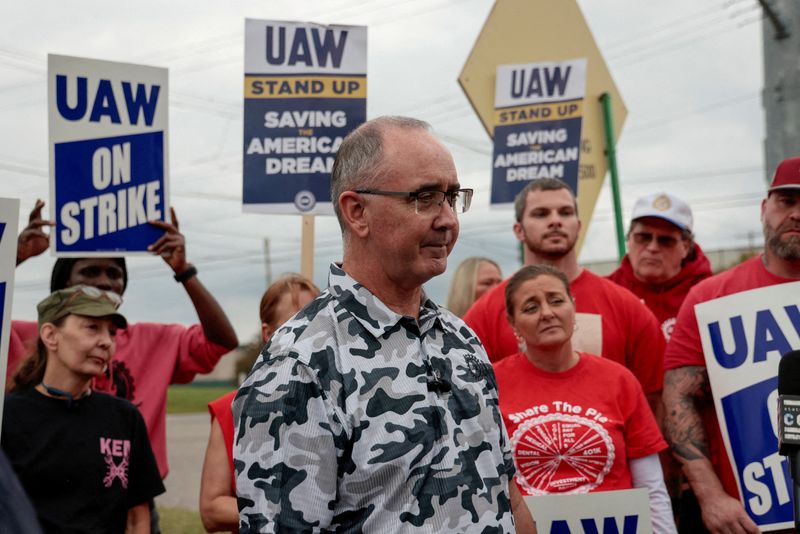By Joseph White and David Shepardson
DETROIT (Reuters) - The United Auto Workers held off on additional strikes against Detroit Three auto plants on Friday, citing General Motors (NYSE:GM)' unexpected willingness to allow workers at joint-venture battery plants to be covered by union contracts.
GM's concession could be critical if rivals Ford Motor (NYSE:F) and Chrysler parent Stellantis follow suit, potentially clearing the way for final agreements that would shore up the union's position as the industry switches to making electric vehicles.
"Our strike is working, but we’re not there yet," UAW President Shawn Fain said in a livestreamed update on negotiations with the three automakers.
Automakers have more than doubled initial wage hike offers, agreed to raise wages along with inflation, and improved pay for temps, but the union wants higher wages still, the abolishment of a two-tier wage system and the expansion of unions to battery shops at all three companies.
Until Friday, the UAW had ratcheted up action against different automakers weekly to try to get its demands met. Threatening to strike against GM's Arlington, Texas, plant that makes cash-cow SUVs like the Cadillac Escalade spurred GM to agree that EV battery factories would become union plants with UAW contracts, Fain said.
Sales of electric vehicles are growing thanks in part to federal subsidies meant to support a U.S. transition to lower carbon emissions, and the union wants those workers to obtain the same pay and job protections granted other members.
"This is absolutely a big step for all the vehicle manufacturers to get a contract done," said Sam Fiorani, vice president of global vehicle forecasting at AutoForecast Solutions. "This was the last major hurdle."
Fain did not say, however, whether workers at GM's battery plants would earn the same pay as union members at other plants.
GM is building three Ultium joint-venture battery plants with South Korea's LG Energy Solution. In August, Ultium said it did not see any path for workers at its Ohio plant to be covered under a national labor agreement, rejecting a push by Democratic U.S. senators.
GM is building a fourth U.S. battery plant with Samsung (KS:005930) SDI in Indiana.
"This defines the transition to EVs," said Harley Shaiken, labor professor at the University of California, Berkeley. "Clearly, GM's concession on the master agreement will positively be matched by Ford and Stellantis."
The fate of battery plant workers was seen as a major sticking point, with Ford CEO Jim Farley on Sept. 29 saying that Fain was holding the deal "hostage" because of that aspect of the talks.
Separately, Ford said on Friday it will lay off another 495 workers in Ohio and Michigan because of the strike's impact on two of its assembly plants.
The companies up to now have resisted including the battery plants they are building under the master agreement, arguing most were joint-venture factories with other majority owners that have to sign off on such an agreement.
"GM has agreed to lay the foundation for a just transition," Fain said in his live broadcast, adding the Detroit company had "leapfrogged" the pack in negotiations with the UAW.
GM declined to confirm Fain's news, saying only that negotiations continue. "We will continue to work towards finding solutions to address outstanding issues," the company said in statement.
LG Energy Solution declined to comment. A spokesperson for Samsung SDI said the company did not have a comment.
Stellantis' North American chief operating officer, Mark Stewart, said in a letter to employees that the automaker is making progress in the talks, "but there are gaps that still need to be closed." Ford declined to comment.
The pressure is only rising on the three automakers as EV market leader Tesla (NASDAQ:TSLA) cut U.S. prices of its Model 3 sedan and Model Y SUV, intensifying its price war and further pressuring profit on all EV models that are forced to match CEO Elon Musk's aggressiveness.
Fain also said on Friday that the UAW could still strike against highly profitable pickup truck plants if progress stalls. So far, the union has avoided walking off the job at those plants.
"We know their pain points, we know their moneymakers and we know the plants they really don't want struck," Fain said. "And they know we've got more cards left to play."
Fain has kept automakers in suspense as to whether he would order additional plants shut down, or give an automaker a pass because they had offered concessions. So far, the union has ordered walkouts at five assembly plants at the three companies and 38 parts depots operated by GM and Stellantis.
Fain said on Friday that Ford had upped its proposed wage hike to 23% through early 2028. Combined with proposed cost-of-living-adjustments, workers could receive pay increases of close to 30%, people familiar with the proposal said.

Fain's Friday video addresses have become must-see events since he launched coordinated strikes at GM, Ford and Stellantis plants shortly after midnight on Sept. 15.
GM shares ended nearly 2% higher on Friday and Ford shares gained 0.8%. Stellantis shares in Milan ended up 1%.